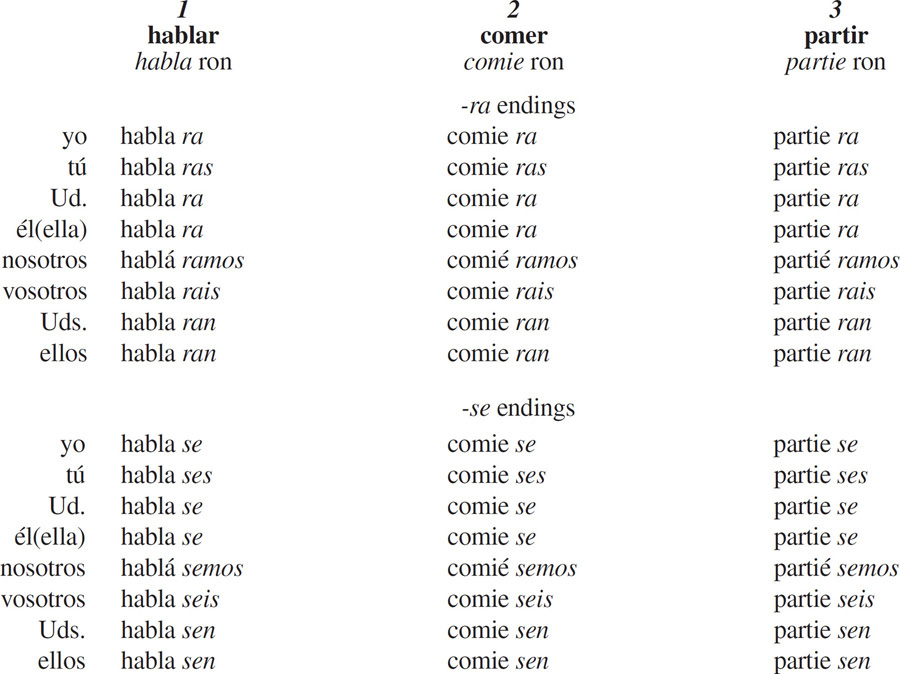
The imperfect subjunctive is formed by adding either the -ra or the -se endings, which are listed below, to the stem of the third-person plural preterit indicative.

The first-person plural of both -ra and -se imperfect subjunctives must have a written accent. There is no difference in meaning between the two forms of the imperfect subjunctive and they may be used interchangeably, although the -ra form is the more common.
Note: The imperfect subjunctive is used after si and expresses something that is not true or that might not happen; it is followed by a clause in the conditional that indicates what would be or would happen if it were true.

Note: The imperfect subjunctive is used after Ojalá to express a wish that something were true.

The imperfect subjunctive may also be used in a clause that follows one of certain expressions in the imperfect or preterit, in which case it is always preceded by que. Examples we will use here are: Era posible que… and Era imposible que…

Write the -ra subjunctive form of the following infinitives according to the subject given.

Write these infinitives in the -se subjunctive that corresponds to the subject given.

A. Write the imperfect subjunctive of the verb in the person indicated.
1. él (hablar) _________________________
2. Elena y yo (vivir) _________________________
3. nosotros (correr) _________________________
4. tú (partir) _________________________
5. yo (pasar) _________________________
6. vosotros (esperar) _________________________
7. Uds. (acabar) _________________________
8. Ud. (caminar) _________________________
9. él (comprender) _________________________
10. Juan y Pedro (tomar) _________________________
11. yo (escribir) _________________________
12. Ud. (amar) _________________________
13. tú (beber) _________________________
14. nosotros (comprar) _________________________
15. ellos (subir) _________________________
B. Change from present to imperfect subjunctive.
1. contestemos _________________________
2. vendas_________________________
3. pregunte _________________________
4. aprenda _________________________
5. escuchen _________________________
6. Ud. escriba _________________________
7. aprendan _________________________
8. Ud. estudie _________________________
9. vivamos _________________________
10. tema _________________________
11. abra _________________________
12. enseñen _________________________
13. asista _________________________
14. tomemos _________________________
15. Uds. reciban _________________________
Write the imperfect subjunctive form for each verb, as indicated.
Si…
1. yo (escuchar) _________________________
2. Uds. (comer) _________________________
3. ellos (no discutir) _________________________
4. tú (entrar) _________________________
5. él (abrir) _________________________
6. tú (comprender) _________________________
7. él (practicar) _________________________
8. ella (cantar) _________________________
9. vosotras (escuchar) _________________________
10. ellos (abrir) _________________________
Era posible que…
11. Uds. (gastar) _________________________
12. nosotros (aprender) _________________________
13. yo (ganar) _________________________
14. Ud. (no llamar) _________________________
15. vosotros (escribir) _________________________
Translate into Spanish:
1. if I taught _________________________
2. if they lived _________________________
3. if we went up _________________________
4. if I didn’t understand _________________________
5. if they took _________________________
6. if he ran _________________________
7. if he answered _________________________
8. if I worked _________________________
9. if you didn’t prepare _________________________
10. if you (s., for.) studied _________________________
11. if they kept _________________________
12. if we didn’t spend _________________________
13. if I travelled _________________________
14. if you (s., fam.) needed _________________________
15. if I didn’t live _________________________
16. if you (pl, fam.) opened _________________________
17. if she wrote _________________________
18. if you (pl., for.) responded _________________________
19. if he feared _________________________
20. if they ate _________________________
Translate into Spanish:
1. It was possible that they would attend. _________________________
2. It was impossible that he would sing. _________________________
3. I wish you (s., fam.) would call! _________________________
4. If she studied, … _________________________
5. If they worked, … _________________________
6. It was impossible that he would clean! _________________________
7. I wish you spoke. _________________________
8. If you (pl., fam.) sold … _________________________
9. It was possible that you (pl., for.) received … _________________________
10. I wish they answered. _________________________